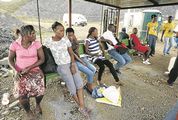Long lives end in decrepitude spell
by Jana Králová,
2016-02-25 06:10:30.0
IN 2100, I will be 117 years old, and my younger sisters will be 112 and 107. According to Cambridge academic Peter Laslett, we can now live to such ages, but those of us who do will be experiencing the so-called fourth age, "an era of final dependence, decrepitude and death".
That’s not quite the dream of "active ageing" and a positive old age.
It used to be that most of us would die at the end of the third age, about 10 years after retiring, when we had plentifully enjoyed the company of our family, were still in fairly good health, and we had successfully completed the life projects we’d planned.
Then, the process of dying and death, and the care associated with it, would happen within a few months.
Now, increasing life expectancy means that we are living longer than ever. But we don’t ask enough whether this is actually good news.
Living into the fourth age means that, little by little, our senses will leave us. We may well be doubly incontinent, and our sight, like our senses of hearing and taste, will be profoundly impaired.
Physical abilities will be severally compromised and we will probably find ourselves bed-bound in a care institution for several years.
Our social universe will shrink significantly and few friends and family members, if any, will be left to visit, leading to feelings of social isolation and loneliness. I also imagine young carers playing us Abba on the stereo because they assume that’s what we listened to in our youth.
According to the Alzheimer’s Society, one in six of us will suffer dementia. Many of us will, therefore, experience dying with reduced mental capacity, along with all its challenges.
And what if we fall into a coma and our next of kin are forced to ask: "Why are patients in permanent comas routinely kept alive?" This will then inevitably raise ethical questions regarding what treatment to give — or not give — to a patient who is nearing the end of a very long life.
Perhaps we will be "lucky" and free of degenerative diseases of the brain. We will then have much more time to think clearly, dwelling on the many emotional hurts that we have done to others or that have been done to us during the course of our lives and that can no longer be put right — something that gerontologist Malcolm Johnson has called "biographical pain".
Johnson suggests that a third of all deaths are people aged over 85. Two-thirds of people older than 75 are women — more in the higher age groups — and two-thirds of this group of women live alone, are widowed or never married, which makes the female population more vulnerable.
This is also perhaps why many have argued that we must be responsible citizens and take charge of our death and dying, as UK campaign organisation Dying Matters advocates.
In general, we are also being encouraged to make legally binding advanced decisions, in case we become minimally conscious.
It is also advisable, if not necessary, to plan for our funerals. This is due to the profound financial strain it puts on our next of kin and the difficulties associated with sometimes unwieldy systems of financial support for funeral services.
In light of the above, I suggest we go beyond talking about "active ageing" and confront the physical as well as spiritual, reality of dying in the fourth age. We need to examine critically what it really means to live so long and whether we really wish to prolong an era of dependence, decrepitude and death.
• Králová is a PhD candidate at the University of Bath. This article first appeared on www.theconversation.com

Picture: ISTOCK
IN 2100, I will be 117 years old, and my younger sisters will be 112 and 107. According to Cambridge academic Peter Laslett, we can now live to such ages, but those of us who do will be experiencing the so-called fourth age, "an era of final dependence, decrepitude and death".
That’s not quite the dream of "active ageing" and a positive old age.
It used to be that most of us would die at the end of the third age, about 10 years after retiring, when we had plentifully enjoyed the company of our family, were still in fairly good health, and we had successfully completed the life projects we’d planned.
Then, the process of dying and death, and the care associated with it, would happen within a few months.
Now, increasing life expectancy means that we are living longer than ever. But we don’t ask enough whether this is actually good news.
Living into the fourth age means that, little by little, our senses will leave us. We may well be doubly incontinent, and our sight, like our senses of hearing and taste, will be profoundly impaired.
Physical abilities will be severally compromised and we will probably find ourselves bed-bound in a care institution for several years.
Our social universe will shrink significantly and few friends and family members, if any, will be left to visit, leading to feelings of social isolation and loneliness. I also imagine young carers playing us Abba on the stereo because they assume that’s what we listened to in our youth.
According to the Alzheimer’s Society, one in six of us will suffer dementia. Many of us will, therefore, experience dying with reduced mental capacity, along with all its challenges.
And what if we fall into a coma and our next of kin are forced to ask: "Why are patients in permanent comas routinely kept alive?" This will then inevitably raise ethical questions regarding what treatment to give — or not give — to a patient who is nearing the end of a very long life.
Perhaps we will be "lucky" and free of degenerative diseases of the brain. We will then have much more time to think clearly, dwelling on the many emotional hurts that we have done to others or that have been done to us during the course of our lives and that can no longer be put right — something that gerontologist Malcolm Johnson has called "biographical pain".
Johnson suggests that a third of all deaths are people aged over 85. Two-thirds of people older than 75 are women — more in the higher age groups — and two-thirds of this group of women live alone, are widowed or never married, which makes the female population more vulnerable.
This is also perhaps why many have argued that we must be responsible citizens and take charge of our death and dying, as UK campaign organisation Dying Matters advocates.
In general, we are also being encouraged to make legally binding advanced decisions, in case we become minimally conscious.
It is also advisable, if not necessary, to plan for our funerals. This is due to the profound financial strain it puts on our next of kin and the difficulties associated with sometimes unwieldy systems of financial support for funeral services.
In light of the above, I suggest we go beyond talking about "active ageing" and confront the physical as well as spiritual, reality of dying in the fourth age. We need to examine critically what it really means to live so long and whether we really wish to prolong an era of dependence, decrepitude and death.
• Králová is a PhD candidate at the University of Bath. This article first appeared on www.theconversation.com



















Change: 0.33%
Change: 0.38%
Change: -0.36%
Change: 0.45%
Change: 0.62%
Data supplied by Profile Data
Change: 1.77%
Change: 0.91%
Change: 0.33%
Change: 0.00%
Change: 0.95%
Data supplied by Profile Data
Change: -1.02%
Change: -0.70%
Change: -1.38%
Change: -1.18%
Change: 0.23%
Data supplied by Profile Data
Change: -0.49%
Change: -0.41%
Change: 0.00%
Change: 1.40%
Change: 1.19%
Data supplied by Profile Data